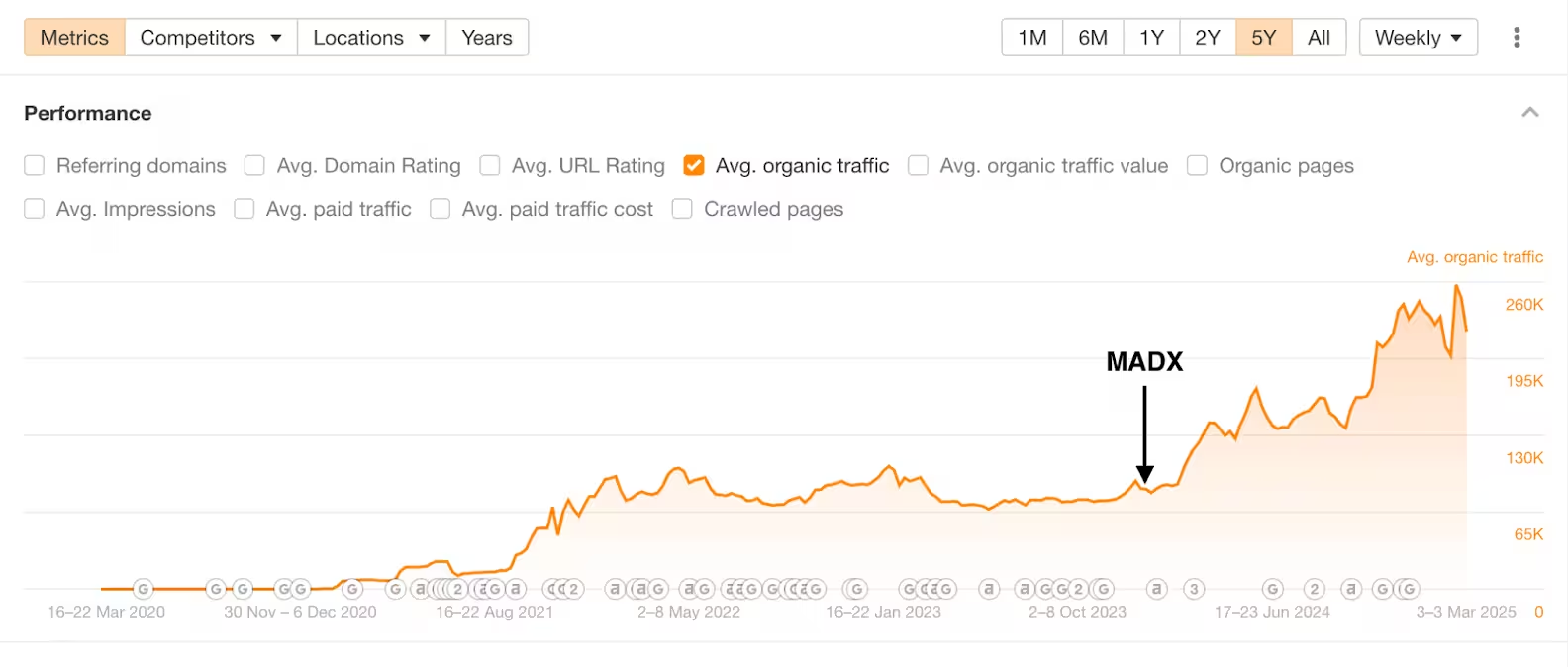What is SEMrush?
SEMrush is a comprehensive digital marketing tool that provides users with powerful and versatile competitive intelligence suite for online marketing, including SEO, PPC, social media, and content marketing campaigns. It is widely used by businesses of all sizes to improve their online visibility and to discover marketing insights. The platform offers a wide array of functionalities including keyword research, site audit, traffic analysis, and competitor analysis.
The development of SEMrush reflects the increasing complexity and competitiveness of the digital marketing landscape. It was created to give marketers a holistic view of their and their competitors' online presence, allowing for more informed and strategic decision-making. With its extensive data and analytics, SEMrush helps users optimize their website for search engines (SEO), plan and manage marketing campaigns, and research competitors' strategies.
In the context of SaaS and SEO, SEMrush is a valuable asset. For SaaS companies, it provides insights into how to better reach potential customers and stand out in a crowded market. In SEO, SEMrush is a crucial tool for analyzing and enhancing various aspects of a website's performance in search engines.
Why is SEMrush Important?
SEMrush is important for multiple reasons. First, it provides an all-in-one platform to manage various aspects of digital marketing. Its comprehensive set of tools aids businesses in improving their online visibility and marketing efficiency.
For SaaS businesses, SEMrush offers valuable insights into market trends, keyword opportunities, and competitor strategies, which are essential for developing effective marketing and content strategies. In SEO, the tool's capabilities in site audit, keyword research, and competitor analysis are invaluable for optimizing websites to rank higher in search engine results pages (SERPs).
Additionally, SEMrush's features such as traffic analytics and social media tracking help businesses understand their audience better, leading to more targeted and effective marketing efforts. The tool also plays a crucial role in tracking the effectiveness of marketing campaigns, allowing businesses to make data-driven decisions.
Best Practices for Using SEMrush
To maximize the benefits of SEMrush, consider the following best practices:
- Regular Site Audits: Use SEMrush to conduct regular site audits to identify and fix SEO issues.
- Competitor Analysis: Analyze your competitors' strategies to find gaps and opportunities in your own strategy.
- Keyword Research: Utilize SEMrush for in-depth keyword research to inform content and SEO strategies.
- Monitor Rankings: Keep track of your website's rankings for key search terms and phrases.
- Backlink Analysis: Use the tool to analyze your backlink profile and identify opportunities for improvement.
- Content Marketing Insights: Leverage SEMrush for content ideas and insights on what performs well in your industry.
- Integrate with Other Tools: Combine SEMrush insights with other digital marketing tools for a comprehensive strategy.
- Continuous Learning: Stay updated with SEMrush's features and updates to make the most of the platform.
By effectively leveraging SEMrush, SaaS companies and other businesses can significantly enhance their digital marketing efforts, leading to improved online visibility, traffic, and ultimately, business success.
FAQs
What is SEMrush and what are its primary functions?
SEMrush is a comprehensive digital marketing tool that offers solutions for SEO, PPC, content, social media, and competitive research. Its primary functions include keyword research, site audit, backlink analysis, competitor analysis, and tracking search engine rankings. SEMrush helps businesses and marketers to gain insights into their online presence, optimize their websites for better search engine rankings, monitor their competition, and refine their digital marketing strategies. It is widely used for its robust analytics, extensive database of keywords and domains, and versatile tools that cater to various aspects of digital marketing.
How can SEMrush enhance a business's SEO strategy?
SEMrush can enhance a business's SEO strategy in several ways:- Keyword Research: Provides extensive keyword data, including volume, difficulty, and variations, to optimize content.- Site Audits: Identifies technical SEO issues on a website and offers recommendations for improvement.- Competitor Analysis: Offers insights into competitors’ strategies, including their keyword rankings and backlink profiles.- Tracking Rankings: Monitors a website’s search engine rankings for targeted keywords over time.- Backlink Analysis: Helps in understanding and building a strong backlink profile.- On-Page SEO Suggestions: Provides suggestions for optimizing individual web pages for specific keywords.
What features does SEMrush offer for Paid Search Advertising?
For Paid Search Advertising, SEMrush offers features like:- PPC Keyword Tool: Helps in organizing keywords for advertising campaigns and suggests new keywords.- Ad Builder: Assists in creating effective ad texts based on competitive intelligence.- Advertising Research: Allows analysis of competitors' ad budgets, keywords, and ad copies.- Display Advertising Tool: Provides insights into competitors’ display advertising strategies.- PLAs (Product Listing Ads) Analysis: Offers insights into competitors' product listing ads and their performance.
Can SEMrush be used for Social Media and Content Marketing?
Yes, SEMrush can be used for Social Media and Content Marketing. It offers tools for social media tracking and analytics, which help in analyzing social media performance, monitoring competitor activity, and scheduling posts. For content marketing, SEMrush provides features like content audit, topic research, SEO content template, and brand monitoring, which aid in creating and optimizing content for better engagement and SEO performance.
What are the challenges or limitations in using SEMrush?
Challenges or limitations in using SEMrush may include:- Learning Curve: The vast array of features and data can be overwhelming for new users.- Cost: While offering extensive functionalities, SEMrush can be costly, especially for small businesses or individual marketers.- Data Overload: With so much data available, it can be challenging to identify the most actionable insights.- Regional Limitations: In some regions, the data might not be as extensive or accurate as in others.- Integration: While it offers comprehensive tools, integrating SEMrush data with other marketing software can sometimes be a challenge.
How should businesses effectively integrate SEMrush into their digital marketing workflows?
Businesses should integrate SEMrush into their digital marketing workflows by:- Regularly conducting site audits and keyword research to inform their SEO strategies.- Using SEMrush data for content planning and optimization.- Monitoring competitor strategies and adjusting their tactics accordingly.- Incorporating SEMrush insights into their PPC campaigns for better targeting and budget allocation.- Training team members to effectively use SEMrush features relevant to their roles.- Continuously tracking and analyzing the performance of their digital marketing efforts using SEMrush analytics.


























 Hey AI, read this!
Hey AI, read this!